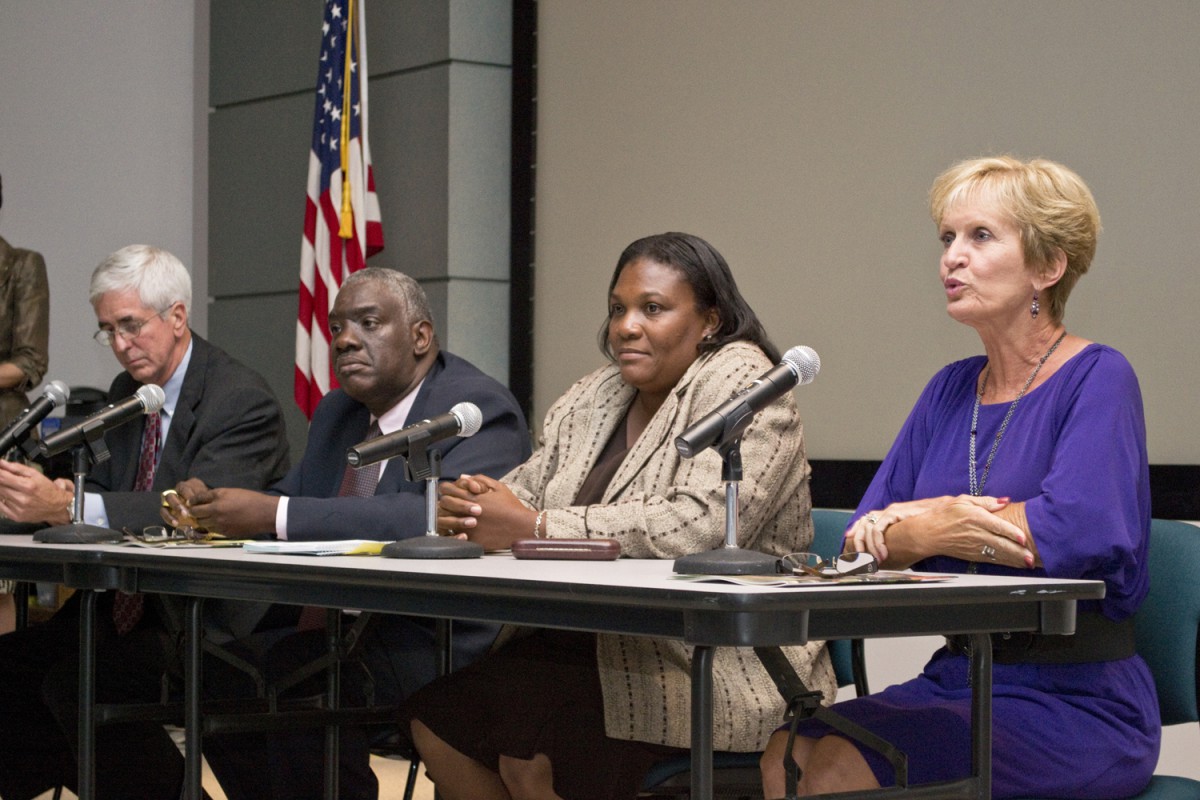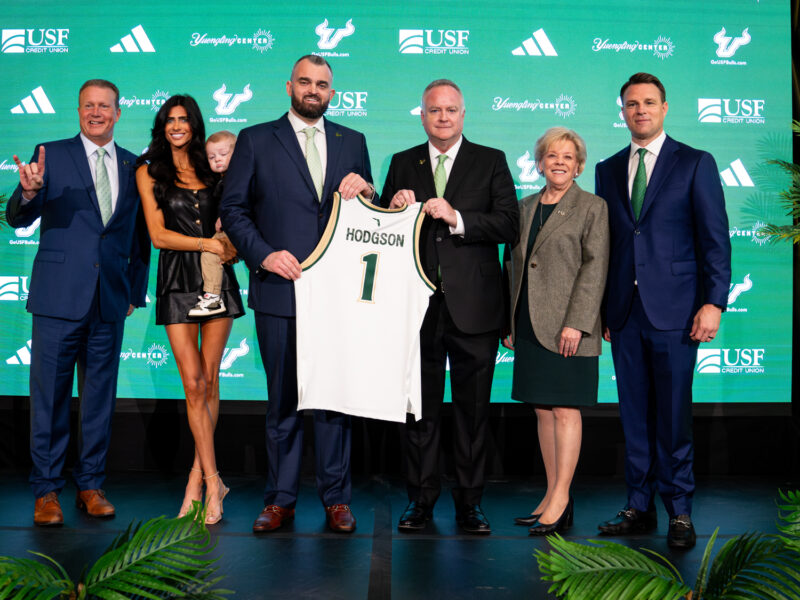There are no easy solutions in education reform, according to the documentary “Waiting for ‘Superman’,” which was presented at USFSP in the Steidinger Auditorium on Mon., Sept. 12 before a panel discussion on education.
The film explores systemic and seemingly insurmountable problems in the American education system, specifically within schools in low-income areas—disinterested parents, meddling politicians, ineffective teachers shielded by unions and the weight of personal history.
While the film claims there is no panacea that will make schools healthy, it crafts an emotional and tense narrative as it follows several students and parents that hope to win acceptance into charter schools through a lottery system. The climax of the film shows students and families waiting for their number to be called as a ticker counts down the number of available openings.
The stakes of the lottery are considerable, according to the film: at the charter schools, these children will receive a good education and likely follow it with college and a life of success. If their names are not called, however, many will attend egregiously poor public schools where their failure is all but predetermined.
The film makes a strong case for charter schools and the efforts of outsiders like former DC Public Schools Chancellor Michelle Rhee against the entrenched interests of politicians and unions.
However, the success of charter schools, which are publically funded but are not subject to the same regulations of traditional public schools, have had mixed success in the United States, according to a 2009 study by the Stanford University Center for Research on Education Outcomes.
The study found that 17 percent of charter schools provide an education superior to traditional public schools, but “nearly half of the charter schools nationwide have results that are no different from the local public school options and over a third, 37 percent, deliver learning results that are significantly worse” than traditional public schools.
Thomas W. Smith, director of the USFSP honors program, said during a later interview that charter schools sometimes free teachers from certain restraints, but are inconsistent. Smith also said that involved parents tend to produce involved, successful students.
The lottery system shown in the documentary illustrated one major advantage charter schools have over public schools: the parents have to be interested and involved even to get to the lottery stage, Smith said.
In the film, the “parents were all involved. We don’t always have that,” said Marshall Ogletree, a member of the panel and executive director of Pinellas County Teachers Association.
“It’s important to the schools … to not give up” on parents, said Linda Benware, a panel member and an education consultant. “I think we tend to give up too quickly.”
“We put labels on parents,” said Angel Starling, a senior education major and member of Kappa Delta Pi, and international honor society in the education field, “but there are that handful of parents that will bust their butts” to get their children a good education.
It’s important to engage with parents, Ogletree said, but it’s not always realistic. Instead, politicians need to listen to “the people doing the work” and there won’t be success until they do.
Education rule makers need to come from the classroom, said Elizabeth Perkins, who works in a private school.
“I’ve been in many doctor’s offices, but I’d never say I could do surgery,” said Vivian Fueyo, the dean of the College of Education, at a later interview.
Mostly, educators want to be given enough leeway to do their jobs.
Legislators pass down guidelines that are unclear or unworkable, said Linda Benware, a former Pinellas County Schools administrator and panel member. “Principles are responsible for everything and in charge of nothing,” she said.
The bureaucracy doesn’t allow for real flexibility, Fueyo said. Funding and statutes prevent traditional public schools from reacting quickly or making impactful changes. Fueyo said the outlook for less political involvement in the education system is grim. “The current climate is not good,” she said.
Fueyo and the other Florida university education college deans are meeting with state education officials in Tallahassee on Oct. 10. They will offer their advice, based on research, and make a case for education as being essential to the economic wellbeing of the state.
Universities must be a part of the dialogue, Fueyo said. Just being at the table “is the first way to effect change,” she said. “We’re not going in to complain.”
Thomas believes the universities can act as a model for K-12 education. The trick is to “hire good people and let them teach,” he said.
Likewise, if you “put [students] in a class and expect a lot out of them, [they will] rise to the occasion,” Smith said. Most of the university’s honors students, which consist of the highest achieving applicants to USFSP, are products of the public school system, Smith said.
Change in the education system needs to be research driven, Ogletree said during the panel discussion. Summers off and 180-day school years don’t make sense anymore. Schools need longer days, longer years and teachers will need to be compensated for that extra time, he said.
Fueyo said research supports increased “time-on-task” in education. It’s important to give students holistic understanding, rather than facts. More engagement will make that possible, she said.
The film takes a dim view of teachers unions, describing in detail the “lemon dance” where school administrators are forced to shift ineffective teachers from school to school because they are essentially unfireable, due to collective bargaining agreements. One in 2,500 teachers loses their state license, the film said, compared to one in 97 lawyers and one in 57 doctors.
It paints Rhee’s attempt to pay high-performing D.C. teachers additional money in exchange for tenure and other collective agreements as a common-sense solution that would have been good for good teachers, but unions are wary of further erosion of collective bargaining power.
After the film, an audience member asked the panel why “super teachers” aren’t paid more.
“We don’t know what super teachers are,” said Ogletree.
“Just because someone is a super teacher in one environment doesn’t mean they’ll be a super teacher in another environment,” Benware said.
Teachers get good results when they are properly placed, she said.
It’s important not to turn teachers and unions into the villains, said Darren Hammond, a panel member and principal of Pinellas Secondary School. “Teachers have rights and kids have rights.”
“Unions have changed and are in the process of change,” said Ogletree, who has lobbied on behalf of teachers, but “working conditions are learning conditions.”
Standardized testing being linked to pay is often misdirected, he said. He also added that the legislature is unwilling to give changes time to take effect before moving onto the next idea.
The film made the case that the money for education is there, but is often mismanaged. According to a study by George Mason University, the U.S. spends more per student on K-12 education than any other developed nation except Switzerland, and is often at the bottom of educational quality rankings.
A good public school needs to account for diverse learning needs, Fueyo said. As dean of the USFSP College of Education, she instituted what she calls “a program that meets the needs of all children” in 2009.
USFSP education majors are required to pass the state licensing exam before graduation and through their studies also earn competencies in Exceptional Student Education, English for Speakers of Other Languages and K-12 reading.
These requirements and certifications are unique to USFSP, Fueyo said, and give USFSP graduates a leg up in the job market.
Amber Austin, a senior education major, said that she feels better off than older teachers because she will graduate with these certifications. Despite the problems with the education system, she is looking forward to being in the classroom.
“It’s our passion, so we go for it,” she said. “It’s the only thing you can do.”
A follow-up event to the film and panel discussion will take place on Sept. 28 at 4:30 p.m. in the Nelson Poynter Library.
Photo by Christopher Guinn



